For me, traveling to another country is exciting, interesting, and often challenging.
The hard parts probably have to do with going as inexpensively as possible and trying to not just be a tourist. My first experiences out of the US of A were in the Air Force. That may have set the tone for how I wanted to see the world — from the point of view of those who live in that place. I believe everyone should travel and pay attention.
Sometimes however, there are circumstances that are out of your control or have been caused by those around you.
Crossing the Atlantic by airplane is supposed to be fast these days, but it doesn’t seem that way from the cheap seats. I prefer to sit on the aisle these days but in 2003 I must have been at a window seat because one of my first memories of the trip is looking out after a long restless night and seeing land below me. I imagined it must be England or Scotland we were passing over. That gave me a bit of a thrill. I really was on the way to some place new and different.
We landed in Munich, where we had to change planes. That turned out to be significant. But at that moment, our focus was on getting to the correct terminal and excitement for me because I was standing in Germany. (Does that count as my first trip to Europe?) I moved around the terminal a lot while we waited, trying to get a glimpse of the city but alas…
Our next stop was Dubai. My initial impression was that the airport looked like a giant mall. Lights, signs, stores — I guess it is a giant mall — packed with interesting people from all around the world. We moved quickly to catch a bus that would take us from the giant International Terminal to a smaller “local” departure point on the other side of the airport.
The plane to Afghanistan on a regional airline (Afghan Air?) was packed with contract workers going home. Mostly men, many wore Afghan turbans (shemagh) or the Pashtun hat and scarf. (Most of the video crew began wearing the scarf — I still have my Pashtun hat.)
Sound guy wearing turban (w/amazed Afghans)
Our arrival in Kabul was uneventful except for one thing: one of our bags was not on the plane. It turned out to be a significant problem because inside the bag was some batteries, a battery belt, and almost ALL of our mini DV tape.
My first job upon arrival was to report and track down the bag and find a place to buy more tape. One solution was to contact a couple of other video crews who were in town and borrow some. After much wailing and gnashing of teeth and many phone calls we found out that after Xraying the bag, German security had tossed it into a bomb locker. We explained what it really was, filled out some forms, and finally got it released, but were told it may take several days to get to us.
Much of that was accomplished from our “home” during our stay in Afghanistan, a walled and guarded compound. Seriously, men with M-16 rifles sat up at night by the gate. During the day, however, we felt relatively safe and traveled the city easily along with our guides.
We were all exhausted from the many hours (days?) of travel. I was unusually exhausted and felt sick. My mind was reeling as I climbed the stairs to the one room in the house designated for men. On the floor were (I think) 8 mattresses some with blankets and sheets (I had brought along a sleeping bag).
I chose one in a far corner, put down my back pack and turned to leave the room. I lost my balance and tripped over one of the other mattresses, smashing my elbow through a window. Everyone came running. I was sitting on the floor, thoroughly depressed and baffled by what had happened, but actually unhurt — no blood. I was taken down to the dining area where I sat with tears running down my face (not full blown crying) thinking I did not want to be there but knowing I could not leave.
It turned out the prophylactic malaria medication I was prescribed by the VA was messing with me. I was not the only one. At one point, one of the expat Afghan men had an actual psychotic event that made him hallucinate. He did leave early. I soldiered on.
I stopped taking the medication and after a few days, I was back to normal, but during that next few days we were very busy setting up interviews, tracking down our video tape, and making arrangements to get more.
Finally, we got a call to go to the airport to pick up our luggage. I was loaded into a taxi with an Afghan guide. My head and stomach were still woozy. Upon arrival, the guide stood me against a post and went over to find out where our gear was. Eventually he came back and lead me to a door, pushing me through. Inside the small room was a huge (way over my head) pile of luggage. The guy in charge pointed and indicated that I should find mine. Somehow, I did.
Back at the compound, it was quite challenging, even when I was not feeling poorly. Sleeping in a room with 7 other men, showering in a bathroom on my knees (no shower stall) with water coming from a roof-top gravity-fed cistern, eating (or not eating) food (prepared by Afghans) that may or may not make you sick. Most meals featured couscous, mutton, and fruits or vegetable washed with tap water from the cistern. I probably mostly ate bread and bottled water for the 22 days we were in Kabul. I lost 25 pounds.
One day I walked into the bedroom and discovered a giant black scorpion scampering along the wall. I grabbed a flower pot, covered the insect and slid it out the patio door onto the deck. Calling for one of our Afghan helpers I showed him the bug. “What do we do with it?” I asked. Without hesitation, he stomped down on the poor thing with his sandal-clad foot, smashing it. Then he picked it up by the tail and threw it over the wall into the street.
But I digress, we were there to make a movie.
My job as producer was to make sure everything and everyone was where it —they— were supposed to be. We had two camera crews: Stacia Teele (our producer/director) was teamed up with two Americans; cinematographer Edward Marritz, a sound man whose name I don’t remember, and an Afghan guide/interpreter Mustafa.
I was teamed up with cinematographer Martina Radwan and two Afghans — a sound man and a guide/interpreter (names again unknown.) Martina is originally from Germany. Both she and Edward have since built good careers as videographers.
Our sound guy (the one in glasses) had an interesting story. During the first Taliban government in Afghanistan (1996 -2001) he had worked with several other movie people to hide as much of the Afghan film archive as possible from the Taliban. He said they put hundreds of reels of film into a closet and walled the door over. It was never found and scholars are currently working to digitize the movies.
I accompanied both crews and was often sent out with Martina to capture B-Roll.
Stacia made a “Promo” video called “Back to Afghanistan”. It begins with some of the history of her life in at the American International School of Kabul (now just the ISK) in the 1970s.
In the video she features a couple of fellow alumni visiting and talking with a classroom of only boys, and later a classroom of girls. When asked to draw pictures of their life in Afghanistan, the boys mostly drew planes and bombs. The girls just listen quietly.
We then traveled to houses that Stacia and one other alumnus (Anne) lived in during their teenage years. Stacia’s house was still intact with a happy family living there. Stacia teared up while in the room that was hers as a child. The other house was pockmarked with bullet and bomb holes, the roof had caved in. Still, about 20 people lived inside.
In the beginning of the movie, we visit AISK, where along the way the alumni were amazed that a highway once lined with trees was barren. (The answer was that the Russians cut them all down during their occupation — 1979 - 89 — to stop snipers.) There was a lot of tears and storytelling as we walked through the unoccupied, dilapidated buildings.
Stacia took a trip with only women (thus probably shot by Martina) to watch a young widow attempt to register to vote. The most striking pictures from that sequence are these:
Everywhere we went with a camera we were followed by kids who constantly looked over our shoulders to see what was in the viewfinder.
Kabul was crowded. Millions had left the country when the Russians invaded, many to Pakistan, and millions returned all at once to Kabul after the Russians left.
I don’t know what the crime or security situation was, we did have to have armed guards at night, but as far as I could tell, our guides did not carry guns during the day. We traveled in the city seemingly without a care. It surprised me when we were in the middle of town, to see men openly trading piles money. Other men (only men) had set up business with a satellite phone and a foot cranked generator in the middle of what used to be the Kabul River. The river had been diverted by the Taliban and was now dry. It was the best reception in the area.
We made two trips out of the city. One to visit an Afghan “warlord” Abdullah Abdullah, who at the time may have been a vice president
and a second, longer trip to the Panjshir Valley where Afghan rebels hid and held out during the Russian occupation.
We visited the grave site of their leader Ahmad Shah Massoud, a national hero who was assassinated in 2001. There were pictures of him everywhere in Kabul.
During that journey we saw lots of bombed out — flattened — villages, burned out Russian tanks, and graveyards full of green flags denoting heroes of the revolution.
We also visited and had a meeting (without cameras) with Hamid Karzai, who was president of Afghanistan at the time. As we pulled up to the gate of the Presidential Palace we notice the guards were all mercenary soldiers. As we passed through we were told to get out of the van and enter through a building where more non-Afghan soldiers checked our passports (under the gaze of a 60 caliber machine-gun operator.) Entering the compound, we were escorted by mercenary soldiers to a conference room to wait for the president. Soon a man in a suit (again not Afghan) stepped into the room carrying an M-16, that he placed behind a curtain. Then Karzai swept in followed by several other plain-clothes guards (not Afghan) and aides. The guards stepped back in front of the curtain and we were all seated in a semicircle with the president. Stacia asked a few questions, several others told of their experience at AISK, and Karzai’s staff passed out gifts. I got a vase (that we had here at the HeartGate many years until someone knocked it over and broke it.) There may be photos but no video was allowed.
One of our final visits was to the Kabul National Theatre.
A bombed out building with no roof, the KNT had been used as an interrogation center by the Taliban. It was full of rocket holes and graffiti and the giant rotating stage was a complete ruin. Never-the-less, the Kabul National Theatre company gave a performance on what was left of the stage for us. I remember climbing to the upper story with Martina and getting some incredible footage of Kabul as the sun went down. Also on our return to the stage, we watched as bats swooped up through the hole in the roof, out into the night.
One of the most poignant stories we videoed was with a young expat we brought along with us. He was a child who left with his family during the Russian occupation. They ended up in the U.S. We walked through dirt streets, among destroyed buildings to find his family home. When we did, he also met some of his relatives. He talked with them in Dari then told us his story on camera while he cried.
“I see these faces in my dreams.”
At the end of our trip, we visited Kabul University where there were a lot of female students and a lot of hopeful talk about the future of Afghanistan now that the Americans were back.
Afghanistan: “Steeped in misery for two years ago and now is free as a bird.”
One girl asked: “Will Afghanistan ever be neglected again?”
In 2003, we and the people we met were hopeful and surprised by how quickly and easily life began in Afghanistan began to embrace that “freedom”.
I don’t recommend anyone go there, but it was and remains an important part of my life.
In my next chapter I return to NYC and move to Hood River.





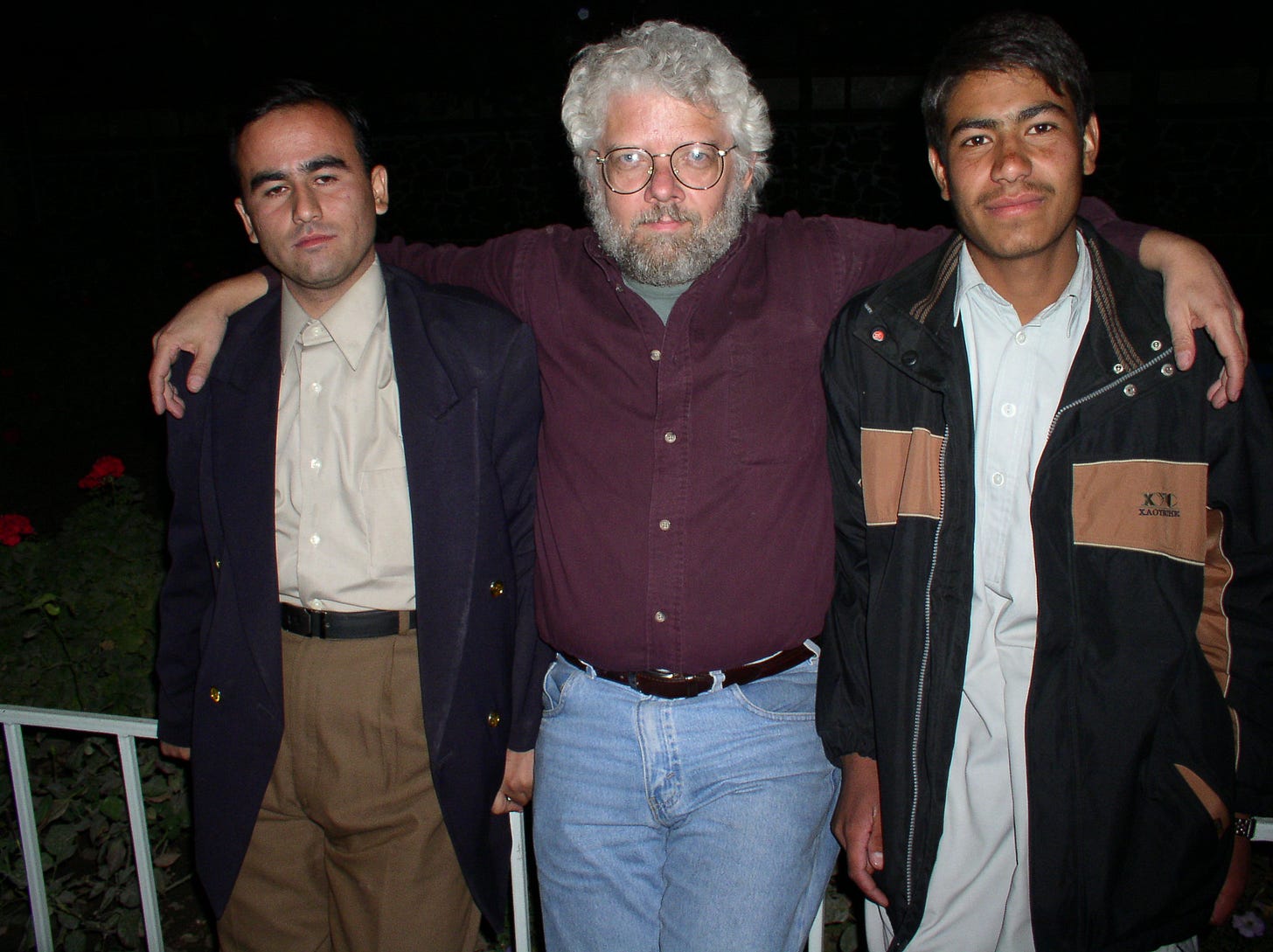
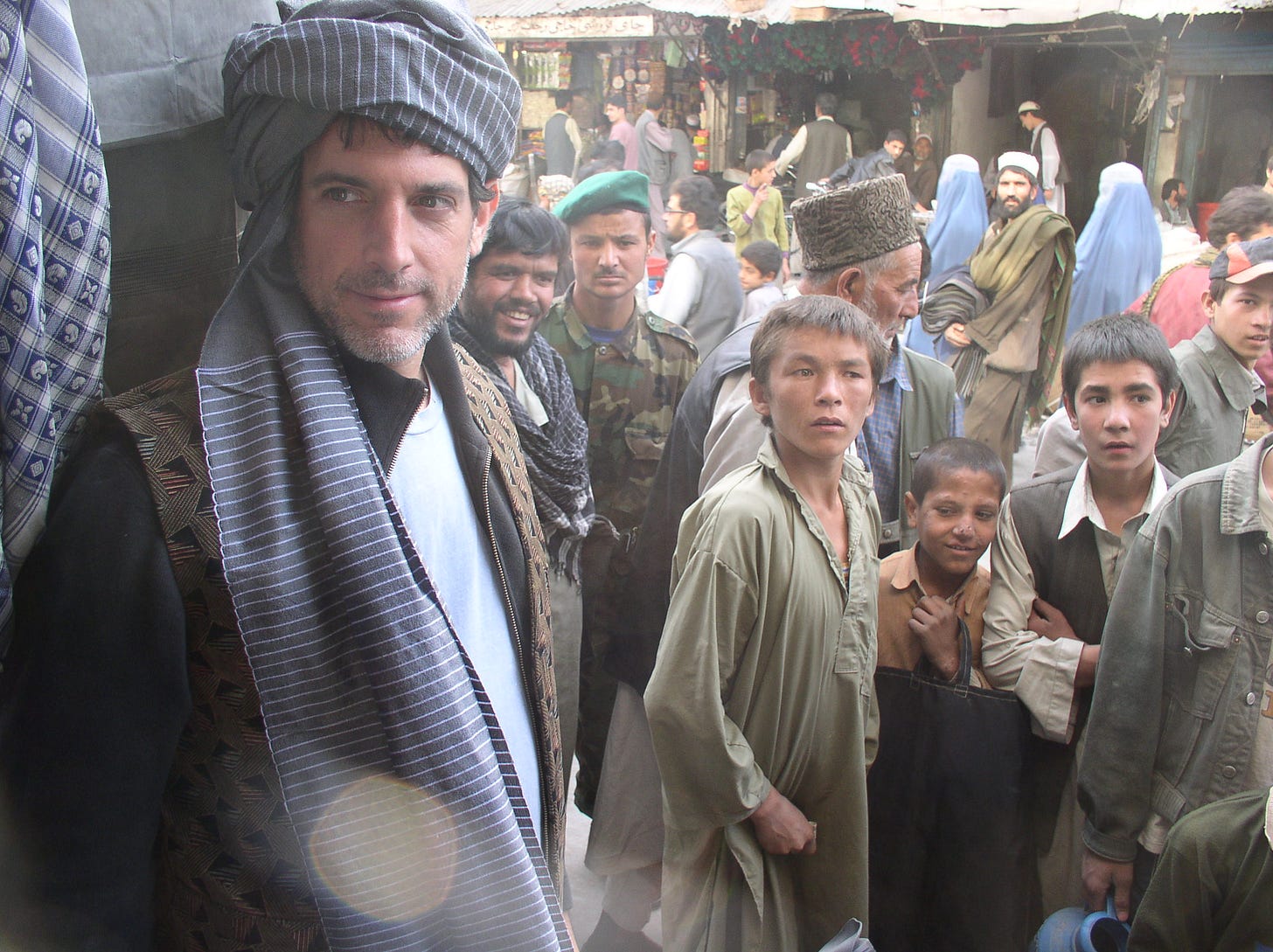

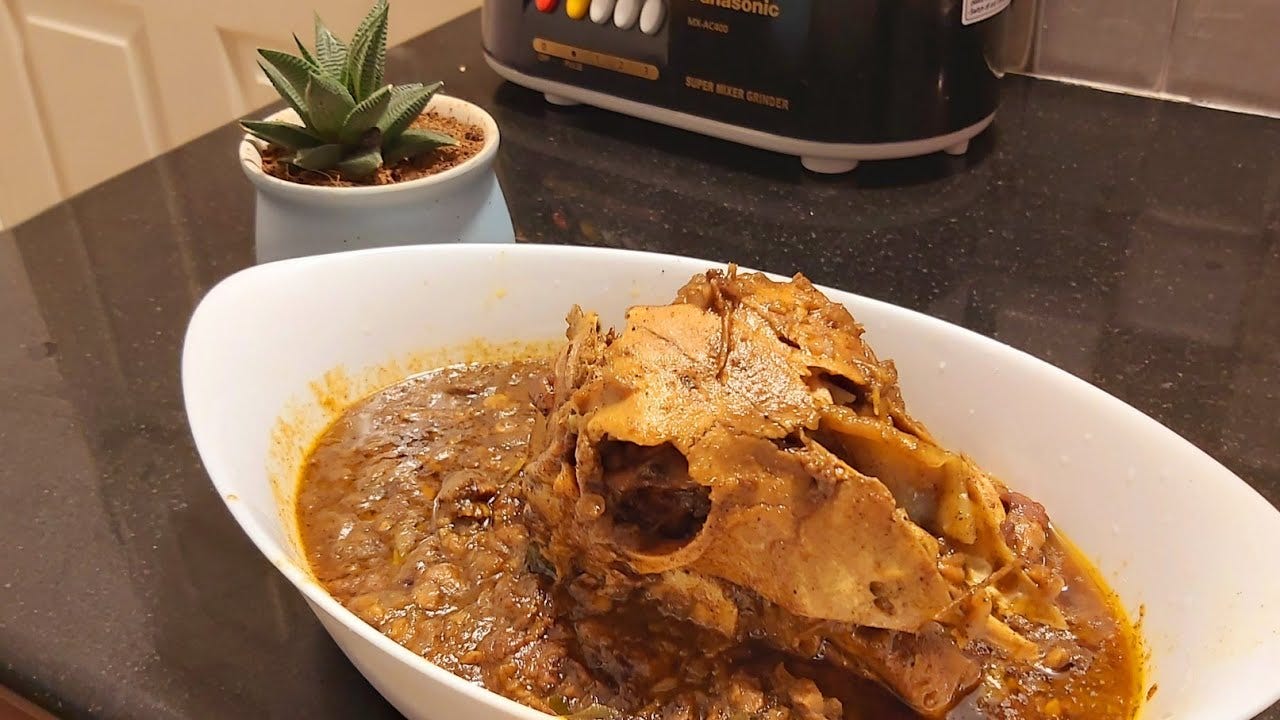
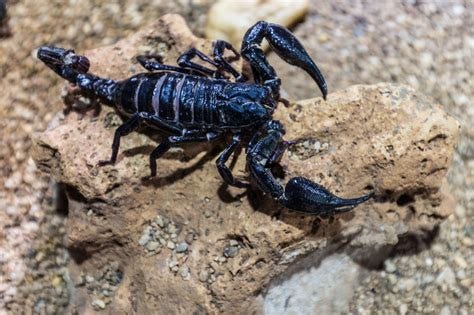
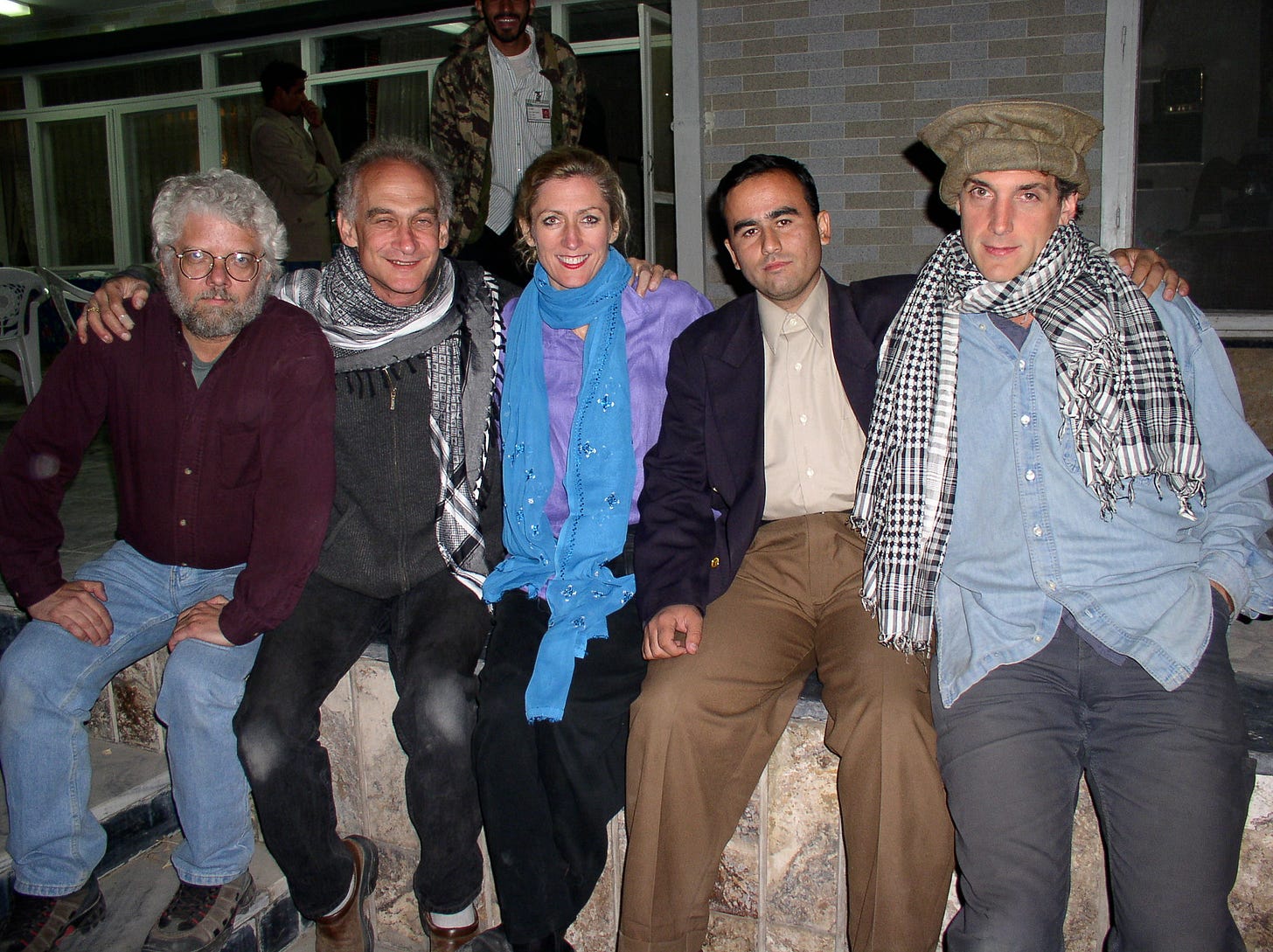
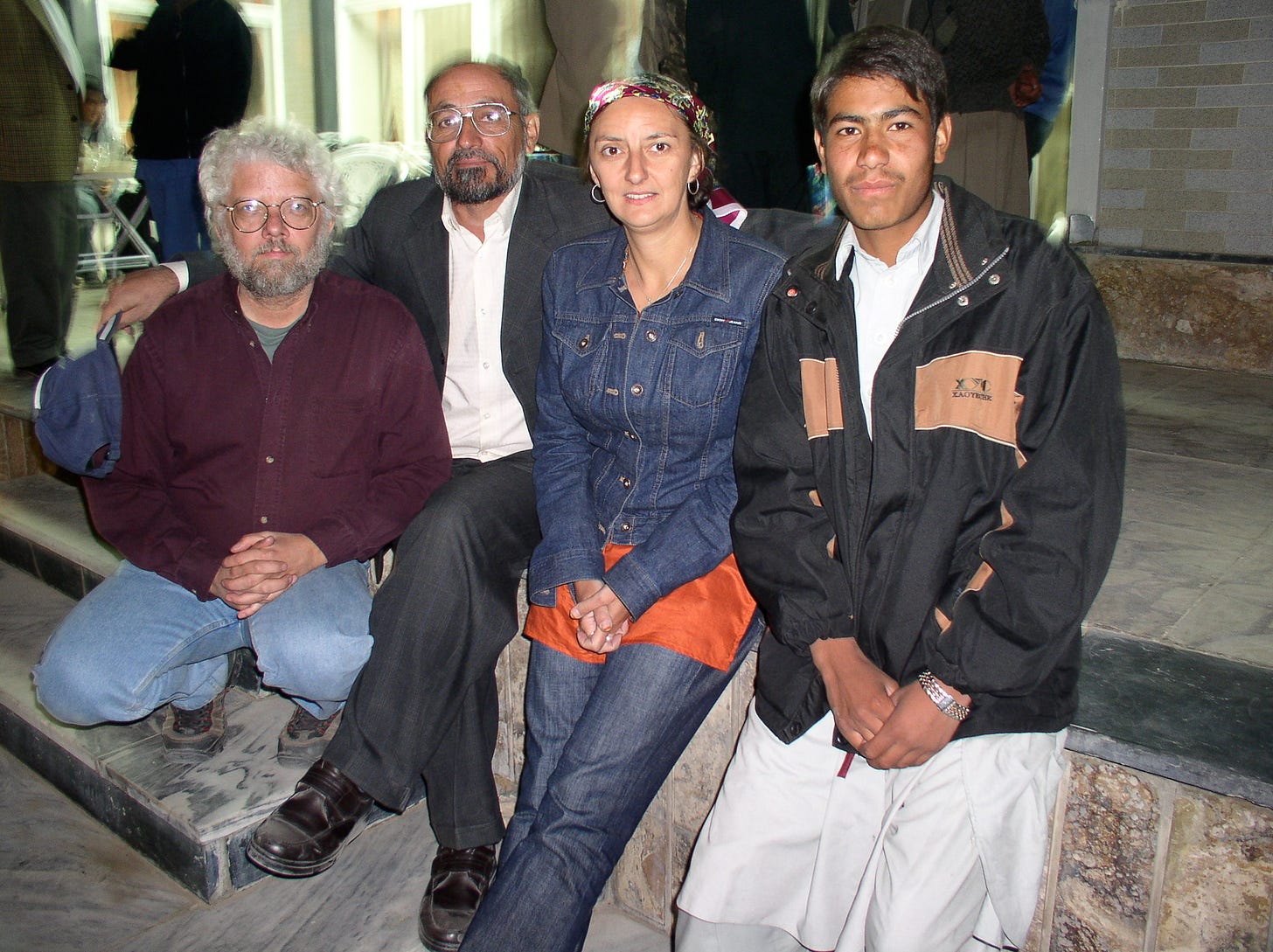
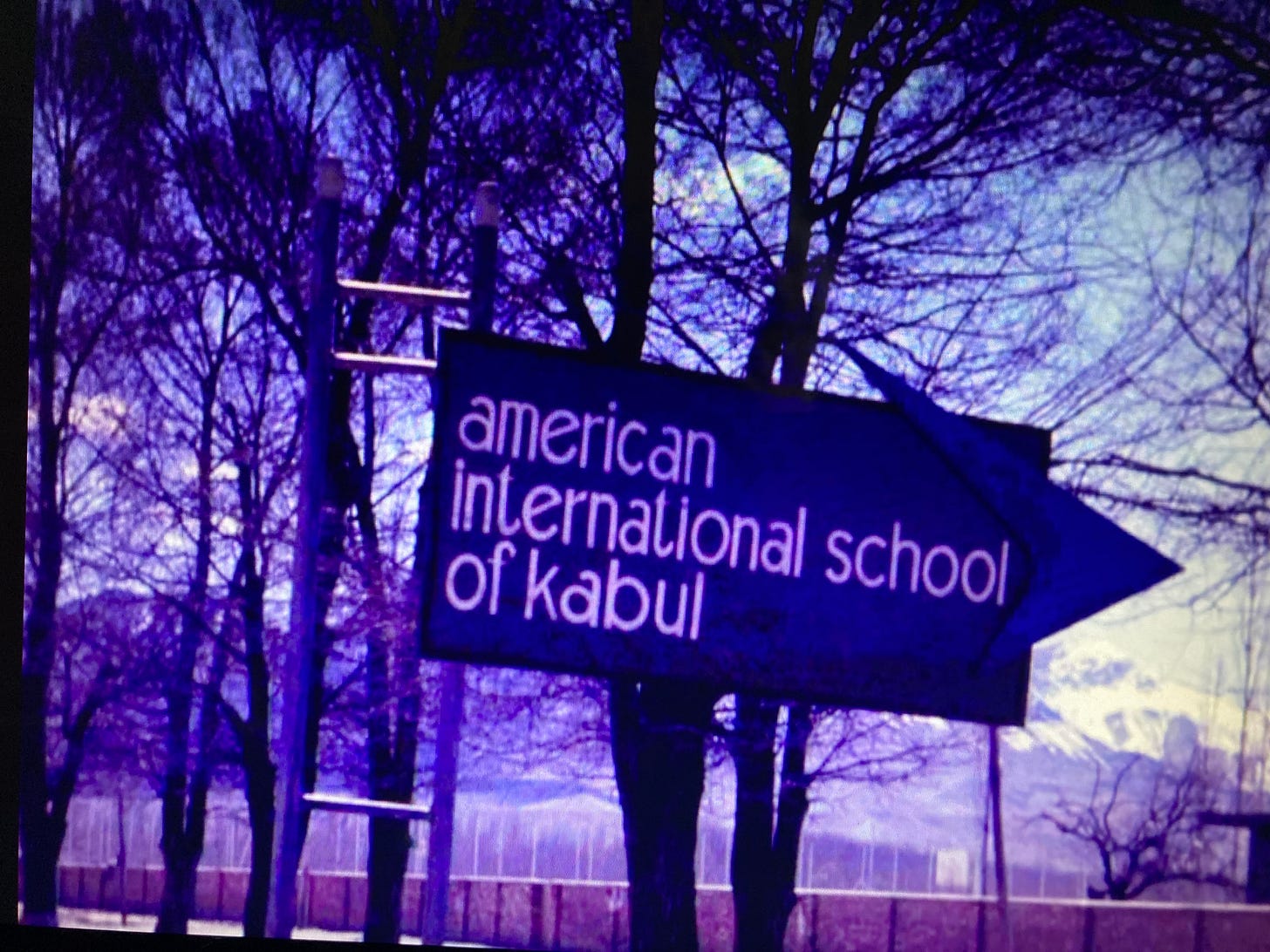
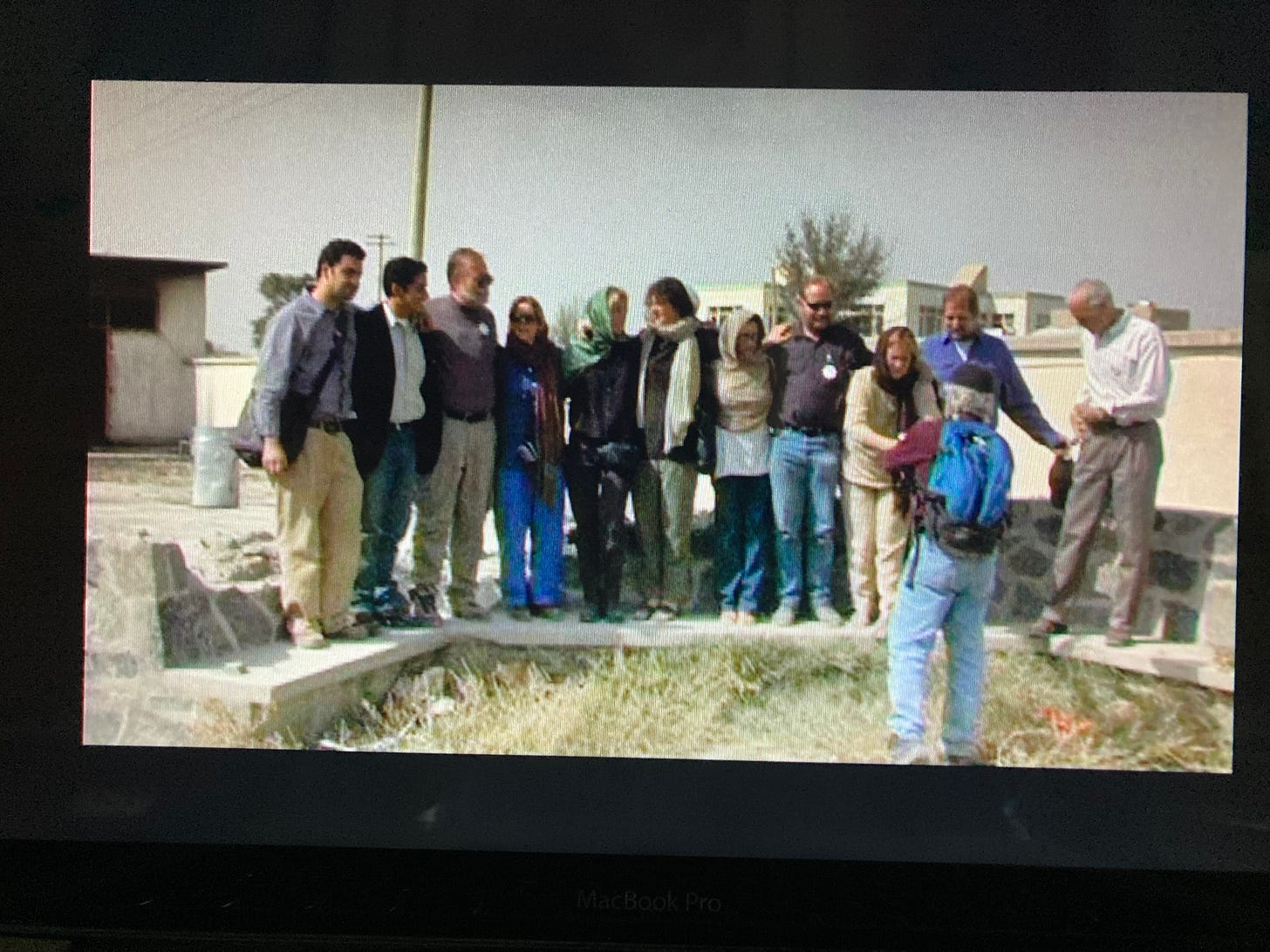





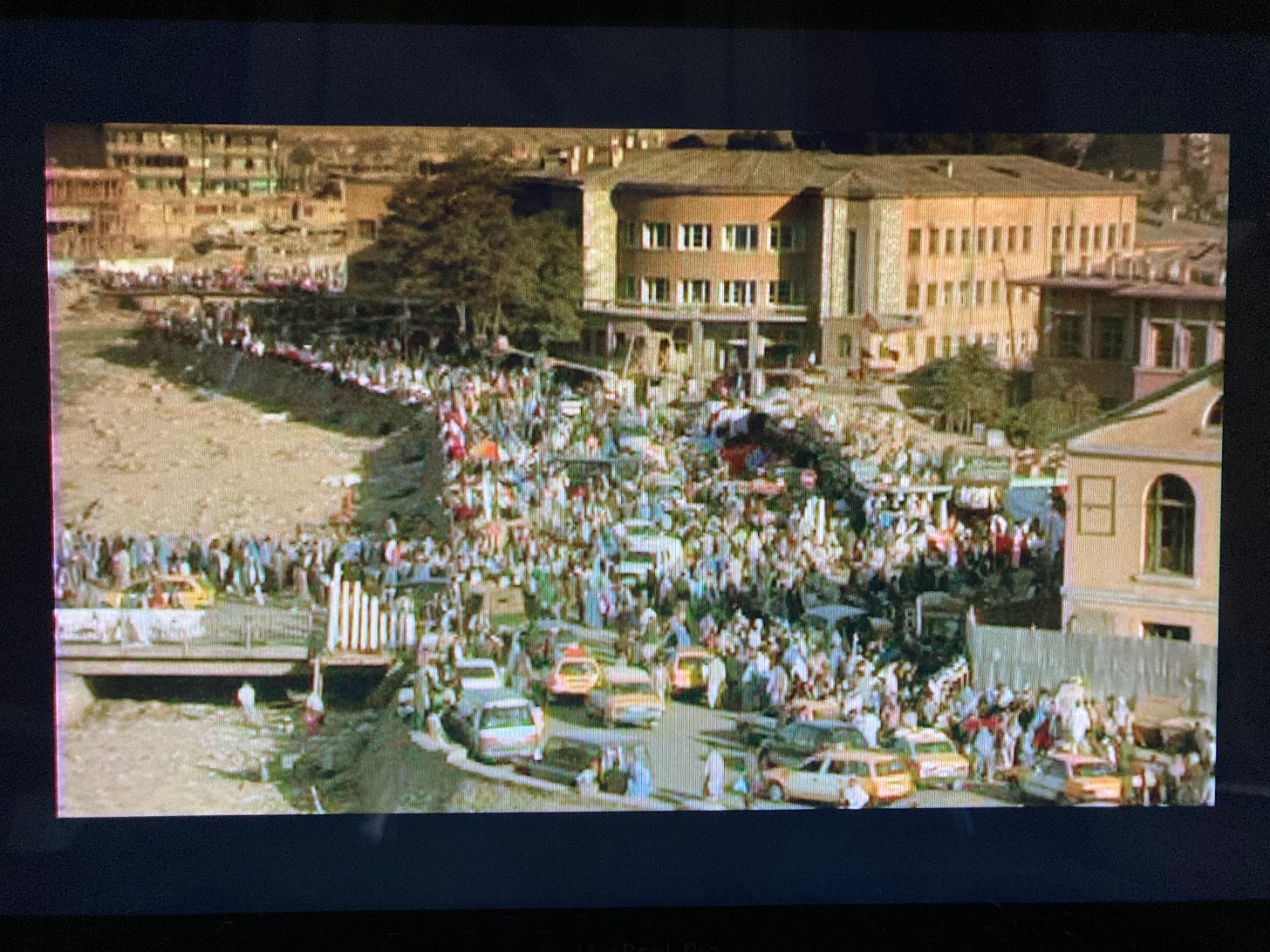
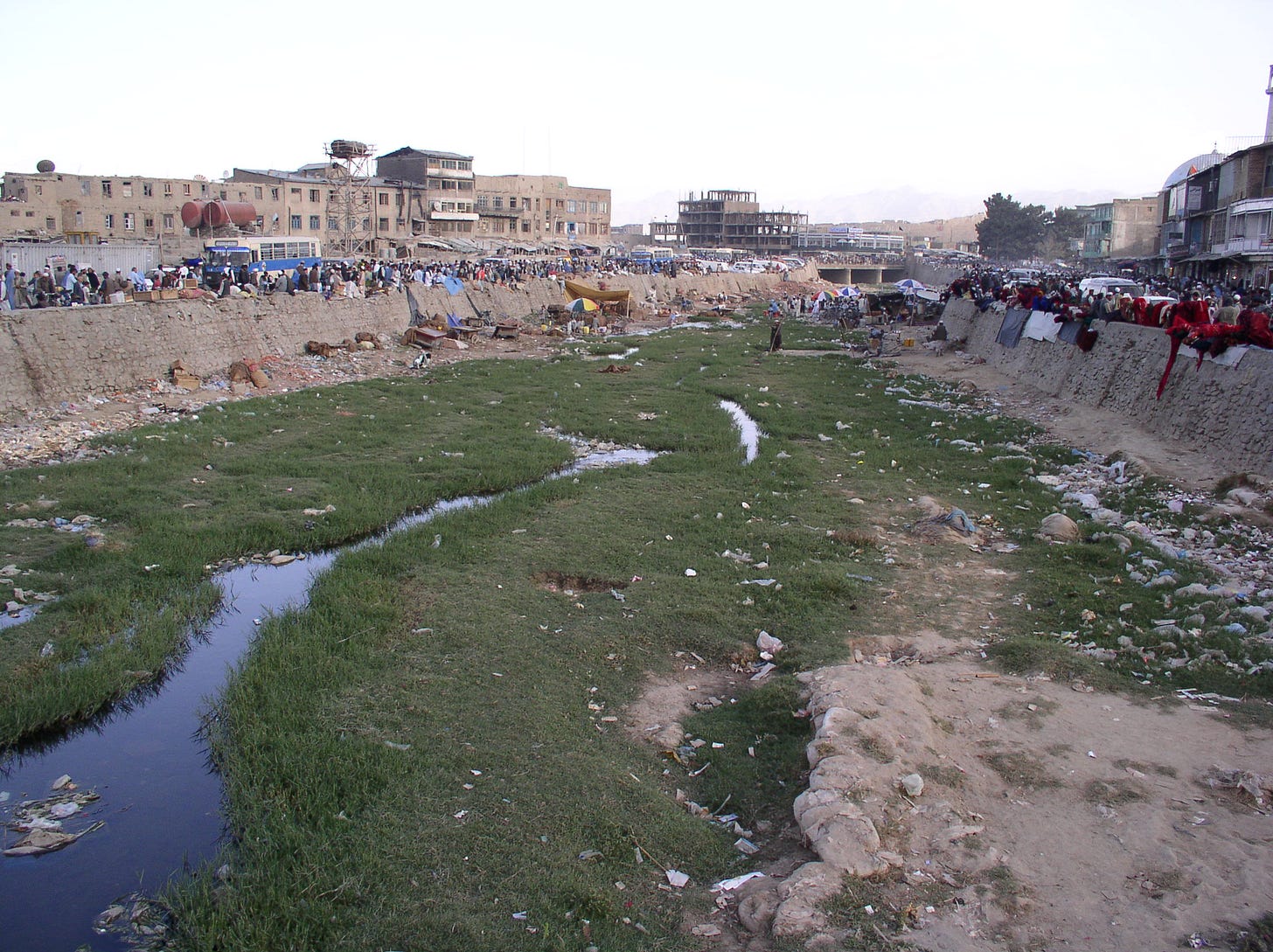

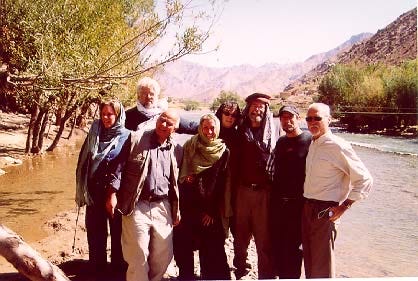

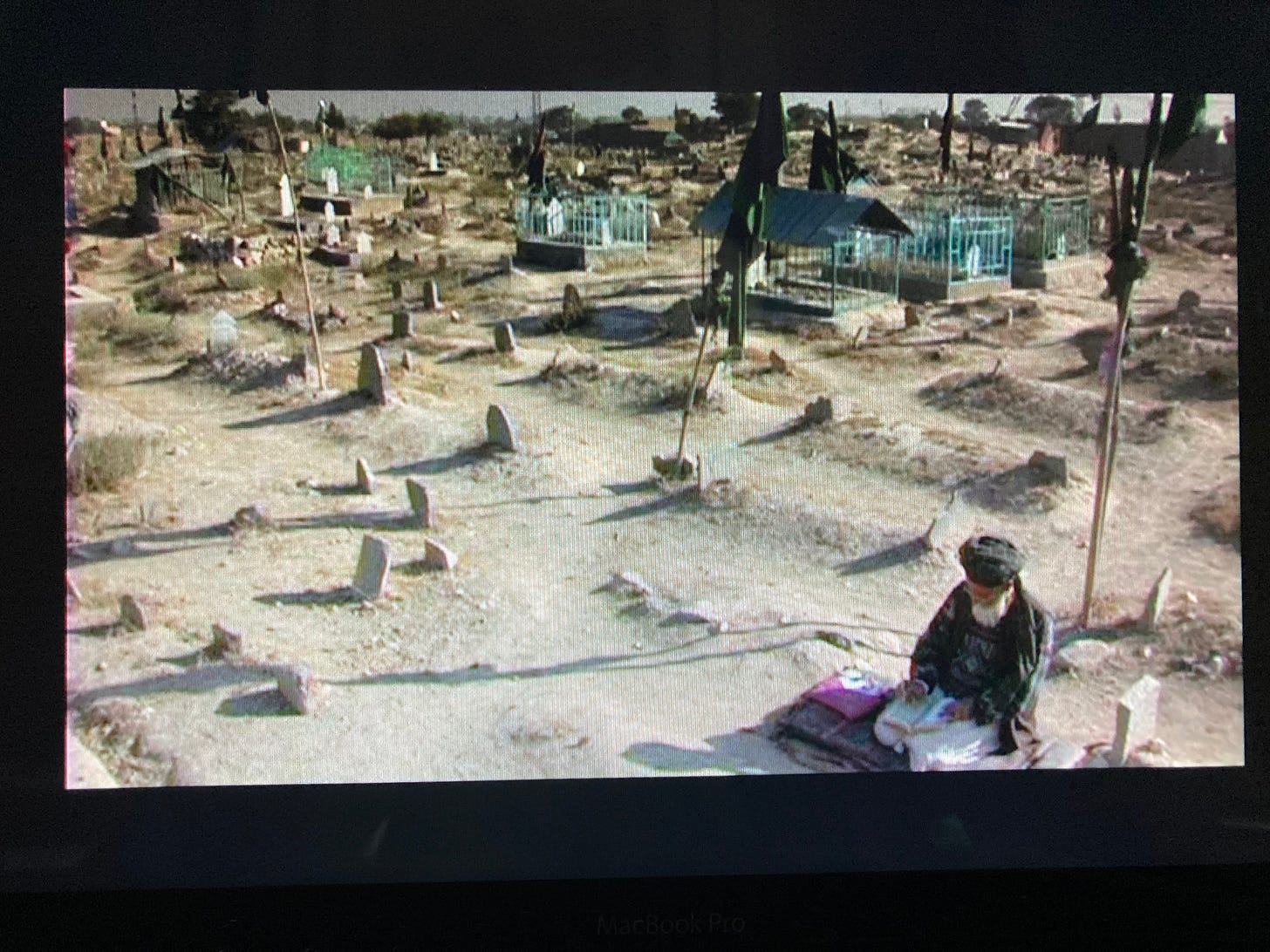
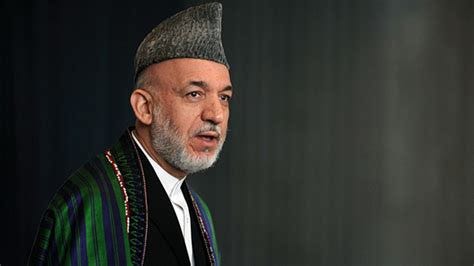





I wanted to learn more about the film you were making. Can we watch it somewhere? How did you get involved in the first place??
I always wanted to go to Afghanistan - but in the 70's, before the most recent invasions and upheaval.
Stellar, thanks for a gripping account.